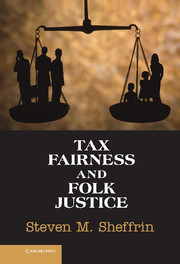Book contents
- Frontmatter
- Dedication
- Contents
- Preface
- Glossary of Terms in Psychology, Philosophy, and Economics
- 1 Approaching Tax Fairness
- 2 The Foundations of Folk Justice
- 3 Fairness and the Property Tax
- 4 Should We Redistribute Income through Taxation?
- 5 Why Do People Pay Taxes?
- 6 Desert, Equity Theory, and Taxation
- 7 Concluding Perspectives
- Bibliography
- Index
Preface
Published online by Cambridge University Press: 05 July 2013
- Frontmatter
- Dedication
- Contents
- Preface
- Glossary of Terms in Psychology, Philosophy, and Economics
- 1 Approaching Tax Fairness
- 2 The Foundations of Folk Justice
- 3 Fairness and the Property Tax
- 4 Should We Redistribute Income through Taxation?
- 5 Why Do People Pay Taxes?
- 6 Desert, Equity Theory, and Taxation
- 7 Concluding Perspectives
- Bibliography
- Index
Summary
Why have Americans severely limited the estate and gift tax – ostensibly targeted at only the very wealthy – but greatly expanded the subsidies to low-wage workers through the Earned Income Tax Credit – now the single largest program to combat poverty in the country? Why at a time when social commentators bemoan the rise of inequality in the United States and throughout the globe do ordinary individuals routinely embrace the astronomical salaries paid to sports stars and entertainers? Why do people hate the property tax so much, yet seemingly revolt against it only during periods of economic change? Why are some property tax reforms successful while others fail? Why are some groups of taxpayers more obedient to the tax authorities than others – even when they face the same enforcement regime? When do tax authorities “cross the line” in their attempts to enforce the law? And, when do some individual tax cheats cross a different line and suddenly become social pariahs?
These puzzling questions all revolve around different aspects of tax fairness. Many would argue that they reveal the extremely limited economic sophistication of the public or its philosophical inconsistency. But there is a more sympathetic and unified explanation for these and similar questions. The key is to recognize and understand the everyday psychology of fairness and how it is applied to taxation. Ordinary individuals hold a set of psychological principles about fairness in taxation that are considerably broader and that differ in systematic and fundamental ways from the ideas of fairness that dominate our public debate today.
- Type
- Chapter
- Information
- Tax Fairness and Folk Justice , pp. ix - xiiPublisher: Cambridge University PressPrint publication year: 2013

